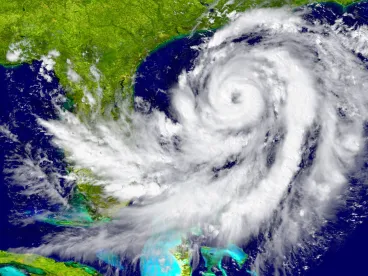Natural Disasters are getting worse. In the wake of disasters such as Hurricane Laura, Hurricane Sally, and the wildfires that recently ravished the western region of the United States, millions of Americans are seeking to donate to those impacted, and/or invest in infrastructure involved in cleanup, repair, and recovery efforts.1 Capitalizing on charity and comradery, fraudulent fundraisers and investments have become more prevalent. These schemes are created with the intention of taking advantage of unsuspecting investors.2 Generally, the people and/or organizations behind these schemes:
-
Pretend to be a legitimate philanthropic entity;3
-
Appeal to the emotions of potential investors by asserting that donations and investments will be linked to or involved with helping victims of natural disasters;4
-
Create donation links to websites, which fraudulently proport to be supporting a good cause on platforms such as “GoFundMe” and “Fundly”;5 and
-
Manipulate the stock market by spreading fake information through social media, investment newsletters, newspapers, and radio, creating a buying frenzy that drives up the price of stock, and then selling their stock at that elevated price.6
The advent and advancement of the internet means that those behind fraudulent fundraiser and investment schemes can reach individuals on a larger scale than ever before. Interaction with social media platforms and the internet in general make it possible for these schemes to reach at least 3.8 billion people per year.7
So, how do potential investors protect themselves from these fraudulent schemes? The Securities and Exchange Commission (SEC) issued an “Investor Alert and Bulletin” Sept. 29, 2020, to answer this question. According to the SEC, asking appropriate questions is a great way to determine whether an investment will support a legitimate cause. The Federal Trade Commission (FTC) has also recommended that potential donators research charity websites before donating.8 Here is a list of helpful questions supplied by the SEC, and another list of helpful research tips supplied by the FTC, that individuals can use before investing or donating. Examples of such questions and areas of research, include:9
-
Ask whether the person or investment company is registered with the SEC;
-
Research charity websites;
-
Use organizations such as BBB Wise Alliance,Charity Navigator, CharityWatch, and GuideStar to help you research charities;
-
Ask follow-up questions to determine how the investment will make money (dividends, interest, or capital gains);
-
When available, donate to more established platforms which have records of prior donations; and
-
Ask about the liquidity of the investment.
If you are asked to donate, rather than invest, you may also be able to verify whether a charity by using government resources. Many state governments collect information to identify legitimate charitable organizations. You should identify where a charity claims to be organized, and then search any website maintained by that state to see if the charity is registered, has filed reports, or evaluate other information collected by the state.
Though internet scams are becoming more prevalent, investors and donors can protect themselves by asking appropriate questions and taking the time to do the research that will assure that your financial aid reaches those you want to help. If possible, you as an investor or donator should refrain from making emotional donations or investments; your financial security may depend on it.
1 See U.S. Securities and Exchange Commission, Investment Scams May Seek to Exploit Natural Disasters – Investor Alert, Sept. 29, 2020.
2 See Bogus Charity Operator Sentenced: Fraudster Tricked Companies into Giving Him Matching Donations, Oct. 19, 2018.
3 See Association of Certified Fraud Examiners, Disaster Fraud.
4 Supra., FN 1.
5 See Here are 6 times people have been arrested over GoFundMe scams, Sept. 9, 2018.
6 Supra., FN 1.
7 See Broadband Search, Average Time Spent Daily on Social Media (Latest 2020 Data).
8 See Federal Trade Commission, Before Giving to a Charity.
9 See U.S. Securities and Exchange Commission, Ask Questions – Questions You Should Ask About Your Investments. Also See Federal Trade Commission, Before Giving to a Charity.


 />i
/>i
